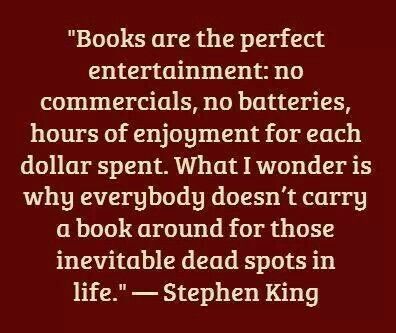Loves books and cats
Best things in life: books, beaches, cats, chocolate, sunsets, sleep
Amazing WWI novel


Wow, this book deserves all the accolades it has received over the years. It is the quintessential war novel which was written in the 1920s and the ideas are as pertinent today as they were then. For those who don't know, the story is about a young German man who serves as a soldier in WWI. Erich Maria Remarque knows what he was talking about because he served in the German army during the war. It is a devastating portrayal of the waste of the lives of young men in a war zone. Even though the particulars of battle are different today since we have much more sophisticated weapons, the overall effect of the bombardment of bombs and the horror of men dying all around you would not be any different for those who served in Iraq or Afghanistan or any other modern war. I've read several books about the experiences of some of our troops in Iraq, and the descriptions of war are amazingly similar.
And it isn't just the battle scenes themselves which have so many similarities to today's wars. Remarque obviously thought deeply about what events transpire to bring about war. In one scene, Paul, the narrator, and his friends were discussing who starts a war. His friend commented, "True, but just you consider, almost all of us are simple folk. And in France, too, the majority of men are laborers, workmen, or poor clerks. Now just why would a French blacksmith or a French shoemaker want to attack us? No, it is merely the rulers. I had never seen a Frenchman before I came here, and it will be just the same with the majority of Frenchmen as regards us. They weren't asked about it any more than we were." Soldiers don't start wars except possibly guerilla wars. They are only told to go and kill the other guy even though they personally probably do not have any actual grievances against each other.
A man cannot realize that above such shattered bodies there are still human faces in which life goes its daily round. And this is only one hospital, one single station; there are hundreds of thousands in Germany, hundreds of thousands in France, hundreds of thousands in Russia. How senseless is everything that can ever be written, done, or thought, when such things are possible. It must be all lies and of no account when the culture of a thousand years could not prevent this stream of blood being poured out, these torture-chambers in the hundreds of thousands. A hospital alone shows what war is.
I can imagine the young soldiers of today who fought in Iraq or Afghanistan reading this book and thinking that the experiences of the characters in the book is true to what they experienced in their real war. We heard much about how some of our soldiers came back from Iraq and how they can't relate to their lives any longer outside of a war zone. Certainly many Vietnam veterans had the same problem. In the novel, Paul and his friends knew exactly that feeling. They went straight from school to the war. They were encouraged to enlist by their school master, even made to feel they would be cowards if they didn't go. So school and war is all they've ever known. And they cannot envision life after the war.
I am young, I am twenty years old; yet I know nothing of life but despair, death, fear, and fatuous superficiality cast over an abyss of sorrow. I see how peoples are set against one another, and in silence, unknowingly, foolishly, obediently, innocently slay one another. I see that the keenest brains of the world invent weapons and words to make it yet more refined and enduring. And all men of my age, here and over there, throughout the whole world see these things; all my generation is experiencing these things with me. What would our fathers do if we suddenly stood up and came before them and proffered our account? What do they expect of us if a time ever comes when the war is over? Through the years our business has been killing; - it was our first calling in life. Our knowledge of life is limited to death. What will happen afterwards? And what shall come out of us?
This novel is about a war that began one hundred years ago, but the message is for today and always. In the discussion about who starts wars, Paul's friend Kropp has the right idea, I think. "Kropp on the other hand is a thinker. He proposes that a declaration of war should be a kind of popular festival with entrance-tickets and bands, like a bull fight. Then in the arena the ministers and generals of the two countries, dressed in bathing drawers and armed with clubs, can have it out among themselves. Whoever survives, his country wins. That would be much simpler and more just than this arrangement, where the wrong people do the fighting." It sure would save lots of precious lives.
Sadly disappointing

Ugh!! I don’t get why this book is so highly rated. It is a boring and tedious recitation of a teenager’s life over the course of about a year. Charlie’s story is told through a series of letters he writes to an anonymous person. The recipient of the letters is not named and Charlie says in the first letter that he will give the people in his letters generic names to keep his own identity a secret. The recipient has never met Charlie and is not provided a return address, so I'm not sure if that would even be an issue. I found the letter technique annoying because it just as easily could have been a diary. Charlie addresses this issue in the end and says that letters imply communion and a diary can be found. Well there is no communion since the letters are all from Charlie. Without letters from the recipient, it is entirely one-sided.
Charlie is fifteen at the beginning of the story and just about to begin his freshman year in high school. He only seems to have had two friends before this story begins, and one has just committed suicide and the other seems to have outgrown Charlie in maturity. So Charlie begins the school year friendless. He is very socially awkward and pretty much clueless about how other people his age act which doesn’t bode well for making new friends. Yet strangely enough he does, and they are seniors. From what I know about typical teenagers, seniors and freshman rarely become good friends, so I found this to be rather unlikely. But Charlie is actually a year older than most freshmen due to being kept out of school for a year many years earlier, so I’ll allow that this friendship might actually happen given the two year age difference. Many typical things happen in Charlie’s life over the course of this year: he gets his driver’s license, first kiss, first date, first this, that and the other. Many disturbing issues also come up like rape, homophobia, bullying, drug use and so on, but none are addressed in any depth.
Sounds not too bad, right? A story about a teenage boy with lots of pertinent social issues. But it is really pathetically boring. Charlie’s life is like many real-life teenagers meaning that the high points in his life are so awesome to him and the lows are devastating. He falls in love , gets high and does many other teenage things. And he cries --a lot, and that is one of the reasons he goes to a therapist and takes medication. And ultimately the reader and Charlie discover the reason for his frequent crying. Still I just didn’t feel Charlie’s anguish. I didn’t feel much of anything at all. This might be the YA novel that makes me decide not to read any more YA books, at least for quite a while. I have concluded before that YA books have so much angst that it gets on my nerves. In this story, the angst didn’t seem genuine; it felt flat or something. Charlie is too emotionally detached. And yes, I know why he is detached because I read to the end, but still.... I was disappointed because I just expected more.
Nice historical fiction


Publisher's synopsis: The year is 1927. As rains swell the Mississippi, the mighty river threatens to burst its banks and engulf all in its path, including federal revenue agent Ted Ingersoll and his partner, Ham Johnson. Arriving in the tiny hamlet of Hobnob, Mississippi, to investigate the disappearance of two fellow agents on the trail of a local bootlegger, they unexpectedly find an abandoned baby boy at a crime scene.
An orphan raised by nuns, Ingersoll is determined to find the infant a home, a search that leads him to Dixie Clay Holliver. A lonely woman married too young to a charming and sometimes violent philanderer, Dixie Clay has lost her only child to illness and is powerless to resist this second chance at motherhood. From the moment they meet, Ingersoll and Dixie Clay are drawn to each other. He has no idea that she's the best bootlegger in the county and may be connected to the missing agents. And while he seems kind and gentle, Dixie Clay knows he is the enemy and must not be trusted.
Then a deadly new peril arises, endangering them all. A saboteur, hired by rich New Orleans bankers eager to protect their city, is planning to dynamite the levee and flood Hobnob, where the river bends precariously. Now, with time running out, Ingersoll, Ham, and Dixie Clay must make desperate choices, choices that will radically transform their lives-if they survive.
My opinion: Enjoyable historical fiction, but not as good as a novel as Crooked Letter, Crooked Letter by Tom Franklin which, admittedly, is possibly not a fair comparison since it is not historical fiction. In this novel, Teddy, Dixie and baby, Willy, are wonderfully drawn characters. I wanted to adopt Willy myself. The flashback scenes from both Teddy and Dixie Clay really add to the story. The only character that I really had issues with was Jesse, Dixie Clay's husband. We are shown in some flashbacks that he was nice enough to Dixie Clay for the first couple of years of their marriage that she didn't even know he was a moonshiner. Then by the time of this story, six years later, he is like the devil incarnate with no explanation for the change. And for a such an important person to the story as a whole, he is hardly actually in it. I would have liked for Jesse to be more of a part of the story and to have his character fleshed out a little more.
I had never heard of the floods of 1927 until earlier this year when I read a book by Bill Bryson, One Summer: 1927 that recounts the devastation of the floods and the part Herbert Hoover played in relief and recovery efforts. The Tilted World does a tremendous job of describing how desperate the people of this Mississippi town were with the flooded river and the efforts they attempted in order to keep the saboteur from blowing up the levee and destroying the town. The reader can feel their desperation and the despair of everyone down river when the levee finally gives way.
Definitely recommended, especially for readers who enjoy historical fiction with a southern setting.
Bad imitation
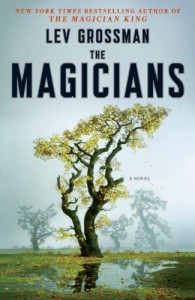
This is a huge rip off. A rip off hybrid between Harry Potter and the Chronicles of Narnia. At first the similarities just seemed like a nice tribute to both of those series, but Grossman steps way over the line from tribute to bad imitation without a backward glance. It doesn't help that none of the characters are particularly likeable. Quentin and his friends seem old before their time, suffering from ennui of life. And Quentin is the worst, never happy with what he has or where he is as soon as the newness of his situation wears off.
They are young magicians who can go anywhere and do anything they want as soon as they graduate from Brakebills, the magician's college they attend. Money and similar issues that non-magicians must worry about will never be an issue for any Brakebills graduate. But these young people are bored and need some excitement. Luckily a former classmate finds a way to go to Narnia --oops, I mean Fillory, which they all thought was just a place in some children's books. Now the adventure begins although they all get a little more adventure than they bargained for.
I won't be reading the next book in the series. And I would recommend skipping this novel and finding something with much more originality.

Publisher's Synopsis: Chief Inspector Armand Gamache of the Sûreté du Québec and his team of investigators are called in to the scene of a suspicious death in a rural village south of Montréal and yet a world away. Jane Neal, a long-time resident of Three Pines, has been found dead in the woods. The locals are certain it’s a tragic hunting accident and nothing more but Gamache smells something foul this holiday season…and is soon certain that Jane died at the hands of someone much more sinister than a careless bowhunter.
My view: I had read that Chief Inspector Gamache is something like Hercule Poirot, which is fine by me since I love Poirot and I would have to say that is an accurate assessment. Gamache is not nearly as stuffy as Poirot, but he does seem to do lots of sitting around and thinking about what he has seen and heard which finally brings him to the right conclusion. But apparently Gamache is not infallible and does not always come to the right conclusion at first, which sets him apart from Poirot. Allusions to some failure in a previous case is mentioned several times, a case that has affected Gamache's career in a negative way.
This is the first of the highly acclaimed, award-winning series by Louise Penny and the first I've read. It definitely won't be the last. I very much enjoyed Gamache and his team and the interplay of their personalities. All of the characters are well-drawn and believable. The mystery has enough twists and turns to keep you guessing without having ridiculous and impossible to believe red-herrings.

This is my first read of this author, and while I may or may not go back and read the first novel in the Samuel Craddock series, this was a pretty good mystery. It is a light, easy read that kept my interest. It is only a 3 1/2 star book for me because the mystery itself was not very compelling. The writing is good with well-developed characters. I cared about some of the characters and the author did not resort to typical small-town, Southern stereotypes. I am from Texas and know what this town would be like with its focus on high school football and how important that is. So that rang very true. Also the characters didn't all sound like local yokels which I appreciate.
The mystery of the death of Jack Harbin just didn't stand out to me as very interesting though. I didn't know who the murderer was early on which always irritates me, but I kept waiting for something to happen. Once Jack was murdered, it was almost as if the story slowed down to a crawl. The ending then speeds up and races past with the explanation of the motive of the murder completed in a very short space. So pacing is something I would like the author to work on. All in all a nice mystery for readers who don't want anything too heavy.

I rate this two stars for my personal taste and three and a half stars for execution. I'm not a big fan these days of supernatural thrillers. At one time I loved this type of novel from authors like Stephen King but that was many years ago. Michael Koryta did a great job keeping the tension and pace of this novel going strong. It grabs you early on and never lets go. For three quarters of the story, the supernatural aspect is prevalent but not unbelievable. Then things get ridiculous. And that is literally what I kept thinking... This is ridiculous. It just lost me and I skimmed the remainder of the book just to get done. But if a reader enjoys this type of story, they will probably enjoy the whole thing. Overall I give it three stars even though I hated the last part.
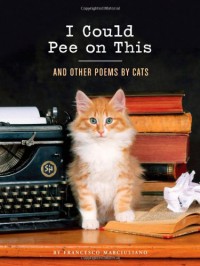
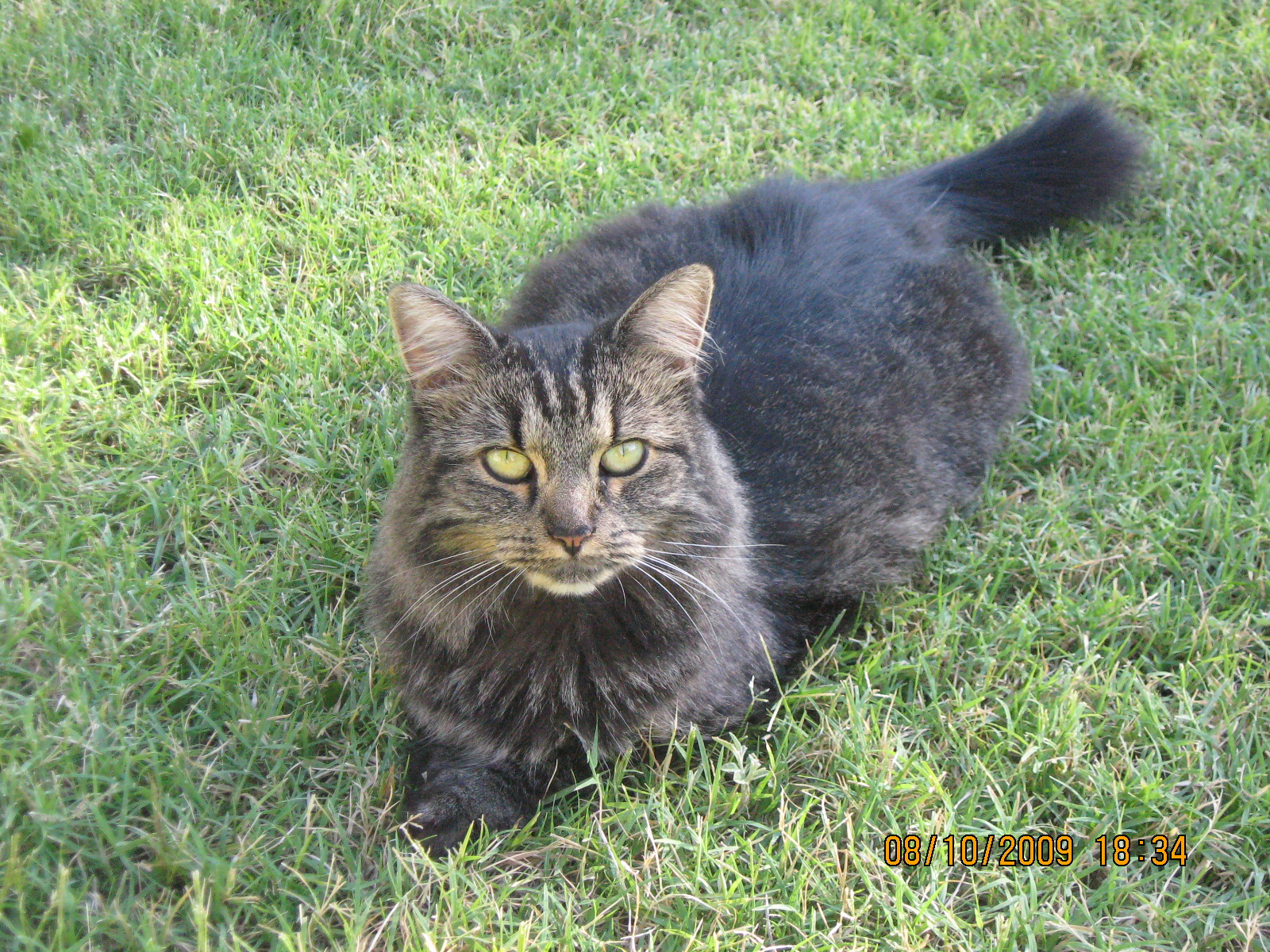 Very cute poems. I read this for the poetry genre for my reading challenge, and I truly enjoyed it although it felt like cheating because probably a third of the book is pictures of cats which I love.. All of the poems are from the viewpoint of a cat and that's probably why it doesn't seem like serious poetry which I feel more like I should read, but then who cares because this about reading what I like. It isn't as I read this for some graduate English course. Yea!! for once I liked some poetry. And some of the poems definitely fit the attitude and personality of my cat (pictured above).
Very cute poems. I read this for the poetry genre for my reading challenge, and I truly enjoyed it although it felt like cheating because probably a third of the book is pictures of cats which I love.. All of the poems are from the viewpoint of a cat and that's probably why it doesn't seem like serious poetry which I feel more like I should read, but then who cares because this about reading what I like. It isn't as I read this for some graduate English course. Yea!! for once I liked some poetry. And some of the poems definitely fit the attitude and personality of my cat (pictured above).
THE FELLOWSHIP OF THE RING

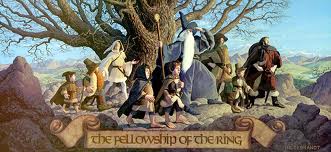 I read this novel for the fantasy genre of my reading challenge. Or maybe I should say that this is a start since I plan to read The Lord of the Rings, so I can't really consider it done until I read all three volumes.
I read this novel for the fantasy genre of my reading challenge. Or maybe I should say that this is a start since I plan to read The Lord of the Rings, so I can't really consider it done until I read all three volumes.
It is a good thing I read The Hobbit first since you really have to in order to know anything about the physical characteristics of hobbits, dwarves, elves, trolls, and so on. And it gives background on the history between the dwarves and elves which is good to know before reading TLOTR. Unfortunately I read The Hobbit at the very end of 2012 and my memory wasn't the greatest about these things. I wish I remembered more about all of that before I read this.
Having said that, I enjoyed this quite a bit more than I did The Hobbit. And I can't really put my finger on why that is so. Fantasy is not my preferred genre and I've done very little reading in it. So the Tolkien books will never be some of my favorites as they are of so many people. I've never even seen the movie versions of TLOTR which probably puts me in with about 5% of Americans. I plan to rectify that issue after I've read the book. One should always read the book before seeing the movie because they are virtually always vastly superior. And it is fun to sit and gripe the whole way through a movie about that very fact.
What I enjoyed about The Fellowship of the Ring is the interplay of the various personalities. Frodo sounds from the beginning like he will be somewhat more brave than Bilbo was in his quest. And he is braver I think. There is less focus on him that I thought there would be and more on all the characters as a whole. I love Sam, Merry and Pippin. They are as brave as Frodo and each as good a friend as anyone could want with their devotion to follow Frodo no matter what. And Aragorn (or Strider) is a practically indestructible man, the silent loner type, and I am interested to see what his future holds.
The only reason I am giving this 4 stars instead of 5 is because there are so many place names and so many references to figures in the history of middle earth. The part of this book where everyone is at Rivendell and they are telling their various stories about how the Ring came into being and how they things got to where they were at that point started boring me. Plus they are sometimes referred to in one language and sometimes in another. It is impossible for me to keep many places and people from the past straight. And Tolkien loved to include all the verses of the songs sung by the hobbits and elves which I pretty much skip over. Nevertheless I enjoyed this volume very much and look forward to the next volume: The Two Towers.
The Long Walk

I originally read this sometime in the 1980s, and the novel is both as I recall and not as I recall. I certainly remembered the basic storyline of teenage boys in a contest that is akin to the Hunger Games but done as simply a walk down a highway with no stopping or rest breaks allowed. Yet I had this idea that it was a short story which it is not.
The story is told as a first person narrative by Ray Garraty, a 16 year old boy from Maine. The long walk contest consists of 100 young men (18 or younger) who begin the walk in Maine (a setting King virtually always uses), and as I have already noted, must walk continuously until there is only one boy left. They are given water and food concentrates, but no other help may be given to them by anyone other than their fellow walkers. They can't walk slower than 4 miles an hour and are given only 3 warnings before they are eliminated from the race. It becomes a contest not only of physical endurance, but of mental and emotional stamina as well. But when it comes down to it, it is really a story of friendship. Garraty and some of the other walkers form emotional bonds that are the core of the novel.
I have issues with Stephen King giving us no real background as to why the long walk is contested each year in the book. The setting is in Maine in a United States that is somewhat like it was when King wrote it. The 50 states still presumably all exist and there are cars and fast food places and so on. But the government is clearly not the same, and the man in charge of the long walk is some powerful figure called the Major. Whether or not he is the leader of the country is never revealed. At one point one of the boys mentions something about when there used to be millionaires, so clearly things are different. Additionally there are several references to the Squads which are from the police or the military which may come take people away much like the KGB in the Soviet Union. And the long walk is referred to as an event that has occurred for many years. I would have liked some sort of short explanation about the government to better understand why there would ever be an event like the long walk in the first place. The lack of some of the background information just annoyed me. Of course not knowing does not affect the story or my enjoyment of it, it just bugged me. Enough said
.
It is not easy to read about the anguish of the walkers as they all fall apart physically and emotionally. The winner of the contest apparently can have whatever prize he wishes. Maybe for the rest of his life which again is something that isn't made clear. What happens to these young men emotionally is the main theme. The boys connect with each other but also spend much time alone with themselves in their heads. And it drives some of them crazy in the end.
“That's the day's business. Thinking. Thinking and isolation, because it doesn't matter if you pass the time of day with someone or not; in the end, you're alone. He seemed to have put in as many miles in his brain as he had with his feet. The thoughts kept coming and there was no way to deny them.”
Pretty powerful stuff and definitely worth a read.
Time Between Us

I love time travel books so that's why I picked this novel. And it has quite a bit of time travel but with different time parameters than most novels I've seen and that is okay. But really this is primarily a teen romance novel. And <sigh> that is just not my thing. So I'll say that as far as the story goes, it is okay. But I doubt I'll read the second book in the series just because I don't care for romances. For readers who enjoy this genre, this is probably a pretty decent book.
Between Shades of Gray
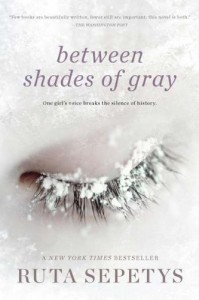
Oh man, this novel is so depressing yet filled with hope at the same time. It is much like One Day in the Life of Ivan Denisovich except that it does not cover just one day, and the narrator is a teenage Lithuanian girl who is deported with her family. The hardships she recounts are increasingly difficult to bear. Lina, her brother, and her mother are sent to a farm labor camp somewhere in a remote area of Russia along with hundreds of other deportees from various countries. Her father is sent to a Russian prison. The conditions are fairly primitive, the labor is hard and food is extremely scarce. But as bad as conditions are, it can always get worse.
Soviet labor camps had slightly better conditions than Nazi concentration camps but not much. This novel takes place during 1941-42, so the events are simultaneous with the Holocaust. We’ve always heard “Never Again” in regard to the Holocaust, but we need to include labor camps in that sentiment. These people were deported only because they committed crimes like having a profession such as doctor or teacher or attorney, helping others escape deportation, being the wrong ethnicity, refusing to cooperate with the Soviet regime, and so on. Lina, her family and the other deportees were considered criminals and many were coerced into signing confessions of their “crimes” with a sentence of twenty years in the camps. Lina’s brother was ten years old and others in the camp were even younger. Age did not make a difference when being sentenced as a criminal against the state.
Lina’s story is fiction, but the kinds of things that occur in the novel are based on real events. The author did extensive research and spoke with numerous former deportees. Thousands of people were deported and many died in either prison or labor camps. Thousands of people who currently live in countries formerly annexed by the Soviet Union have no idea what happened to some of their family. Many deportees just disappeared, never to be heard from again. This is a part of history that I was not totally unaware of, but we hear very little if any about it in our history classes in the US. So as noted before, the story is depressing and hard to bear. But young people especially need to hear this story, and Lina is a narrator that they can understand and hopefully empathize with
Midnight in the Garden of Good and Evil
![Midnight in the Garden of Good and Evil 1st (first) Edition by Berendt, John [1994] - John Berendt](http://booklikes.com/photo/max/200/300/upload/books/94/10/973ae9e7e74b64cdeae643d170db0202.jpg)
"Shots rang out in Savannah's grandest mansion in the misty, early morning hours of May 2, 1981. Was it murder or self-defense? For nearly a decade, the shooting and its aftermath reverberated throughout this hauntingly beautiful city of moss-hung oaks and shaded squares." This is the first two sentences of the blurb on the inside cover of Midnight in the Garden of Good and Evil. So you know the book will be about a murder, but amazingly, the murder is not even mentioned until page 169. I actually went back to read the blurb after about 100 pages to make sure that I wasn't wrong about the murder as a coming attraction.
This is a very enjoyable book if you enjoy reading about a bunch of quirky characters, which is what those first 169 pages were full of. Savannah, Georgia had its share of these characters, and the author, John Berendt, seems to have met them all. What I found a little strange was why so many of them are mentioned since they have nothing whatsoever to do with the murder. Many of them don't seem to have ever even met the accused or the victim. It was fun to read about the man who has a poison strong enough to kill all of Savannah, about Chablis, the black drag queen, and about the ladies who belong to the Married Woman's Card Club and so on. But they are all background characters with no ties to the main event. Readers who love this book, and there are many, may think I am talking smack about their beloved book, but I think all of these characters are just filler. Interesting filler but unnecessary information nonetheless.
Criticism about all of that aside, the murder itself and the subsequent trials, (and yes, there was more than one) were pretty titillating. I have to wonder how I would have voted if I were on one of these juries. I really don't know given what they heard during the trials as opposed to what I knew from the story in this book. So I enjoyed the book even though I thought the quirky characters should have been introduced with much more brevity. In the end, it was a sad, sad story, but I suppose murder generally is.
Julie and Julia

This was both what I expected and not what I expected based on what I heard about the book when it came out and then again when the movie version came out. I expected it to be about a woman who was a confirmed foodie who loved Julia Child’s cooking and decided to try making all of the recipes in one of Julia’s cookbooks at the woman’s home in a year. What I didn’t expect was she had no real interest in cooking in general beforehand and certainly not in cooking anything as complex as the recipes in Julia’s Mastering French Cooking. I’m not even sure I can definitely say why Julie Powell started the project in the first place, even after listening to her book. She was having a crisis of …. what? Sort of a can’t figure out what to do with my life kind of crisis, I think.
Julie Powell had just found out that she has polycystic ovary syndrome, and so her doctor recommended having a child soon if she was going to. She was working as a secretary temp at a government agency in New Jersey even though she and her husband had moved to New York originally for her to try to be an actress. She was going to turn thirty in just a few months. Suffice it to say, she felt her life had gone nowhere really in her twenty-nine years on earth. So she stole her mother’s cookbook and decided to cook each recipe in the next year. There seems to be no real purpose to this except to accomplish it. Which she did but not without lots of drama as would be expected in a kitchen as crummy as hers and without any more cooking expertise than she had.
I admire that she persevered through this project when I would never have done so. For one thing, those of us who do not live in large cities would have had a heck of a time finding some of the ingredients. Even Julie had a hard time with some of them and she was shopping in New York. Plus the time involved in making most of the recipes is way, way beyond what I am willing to spend. I also admire her husband for his understanding and support given the expense as well as hours the recipes took. My husband would not be that understanding, nor would I if the shoes were reversed (so no criticism of my husband at all here). Plus she blogged about all of this as she did it, so kudos to her for all the time spent on the project. I can tell she is not a reader as I am, or she would never have given up all that time she could have been reading to cook.
I have to wonder how interesting the movie is since I enjoyed the book but not enough to see a two hour movie about the same. I’m quite sure Julia Child must play a much larger role in the movie than she does in the book since in the book she is only talked about. Overall the book was enjoyable if you like memoirs and cooking. I listened to the audiobook in which Julie Powell is the narrator, and she does a good job especially when relating the frustrating parts of the food prep. I learned one thing about French pronunciation. I have always pronounced crepe as rhyming with drape, but the French pronounce it as rhyming with step. And so that is how Julie says it which was very weird until I looked it up. I’ll stick with the English pronunciation I think.
 1
1
 1
1

